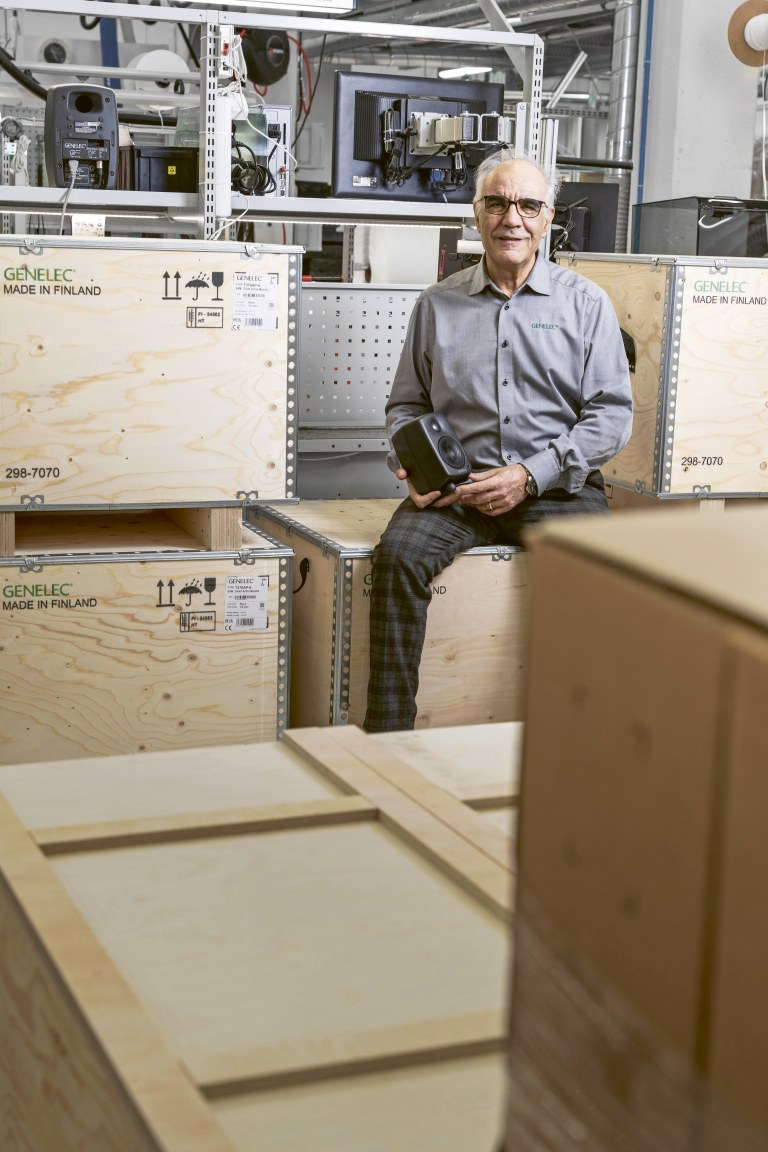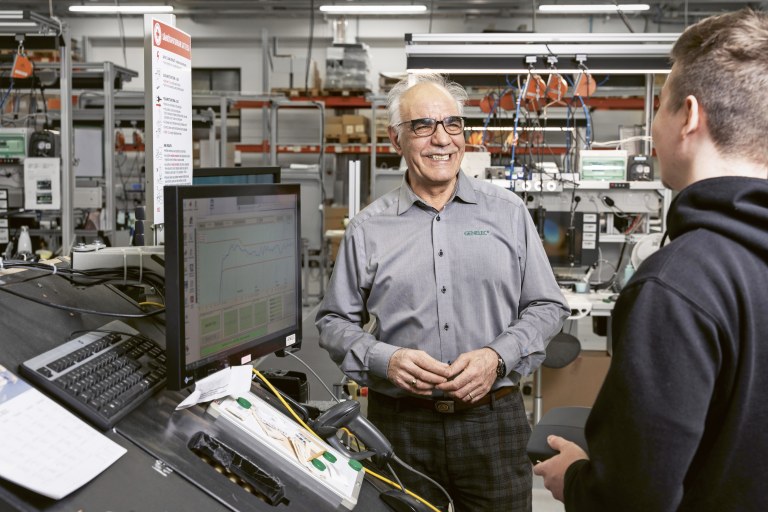
For Siamäk Naghian, it was obvious that he would learn Finnish. It was the late 1980s, and the Iranian-born Naghian had been accepted into the Helsinki University of Technology.
”If I’ve come here to study and work, then of course I have to know Finnish. I was pondering on how quickly I could learn the language, not whether I should," Naghian explains his thoughts at the age of 25. At the time, he didn’t know a word of Finnish.
He recalls that there were about twenty international students at the university, and they were all on the same page about learning Finnish. Naghian explains that he studied everything in Finnish, including electrical engineering, since there were no courses available in English.
Naghian has always been interested in languages, poetry and societal topics. He wanted to be able to understand what was written in Finnish newspapers.
”Music is a hobby of mine, and I wanted to understand what the Finnish songs were saying. They reveal a different path into people's minds and emotions," he adds.
Naghian says he learned Finnish in six months. He gives thanks to his Finnish teacher, who did not utter a word of English during their lessons.
“What a dedicated and patient person, I thought!”
After intensive language studies, Naghian started working. There was plenty of work in the industrial sector’s production lines, and he worked there alongside his studies and during holidays. The job helped him finance his studies.
“Whenever possible, I worked.”
Naghian was the only foreigner at his workplace. According to him, the reception on the production line was fantastic. His colleagues decided to teach him "real Finnish" in addition to the written language and gave him two lists. One of them contained Finnish curse words and the other one Finnish slang.
“It was great! Interacting with people is essential when learning a new language. In a way, I've grown with Finns," Naghian says.
Nowadays, he has a Finnish wife and his best friends are all Finnish.
From Nokia to CEO of Genelec
In 1995, Siamäk Naghian got a job at Nokia. Those were great times for the company. By 1998, Nokia had become the world's leading mobile phone manufacturer and would remain in the lead for another decade or so. Naghian recalls that while the market was international, the company itself wasn’t. He’s certain that knowing Finnish was definitely useful during those years.
At Nokia, Naghian worked in areas including the development and commercialisation mobile phone systems. Alongside his work, Naghian obtained his Doctor of Science in Technology degree in 2001. He also continued translating from Persian into Finnish and became an authorised translator after passing the Authorised Translator's Examination.
In 2005, Naghian joined Genelec, a company focused on audio systems. The company was founded in 1978 by Ilpo Martikainen and Topi Partanen. Genelec's product development unit, factory and headquarters are located in Iisalmi, north of Kuopio. The company's speakers are sought-after and highly valued worldwide, and 90% of its products are exported.
Naghian started out at Genelec as R&D Director in 2005, becoming Executive Vice President in 2010 and CEO in 2011.
“I can't imagine I’d be here if I didn’t know Finnish. Language is key in connecting with others and immersing yourself in society. It inspires trust. If I’ve learned the language, it shows what I’m ready for, how much capacity I have to understand others and how committed I am to being a part of this society," he explains.
Naghian now lives in North Savo with his family and adds – with a smile – that the local dialect does have its own beautiful nuances.
Article continues after the image.

A path to Finland through revolution and chance
Siamäk Naghian feels that Finnish society is great and the more he gets to know it, the more interested he becomes.
“Finnish values are close to my heart.”
But it was a coincidence that he ended up in Finland.
In 1979 there was a revolution in Iran, in which Naghian himself was actively involved. He finds it embarrassing to say it out loud now. Naghian says that he strived for democracy and had good intentions – some sort of high school idealism, in a way.
“When the revolution ultimately took place, it quickly became clear that it was going in a different direction. I wanted to study, but universities were closed down. I couldn’t see many opportunities there, so the only way forward was to leave.”
Naghian didn’t want to leave the country illegally, so he had to join the army to get a passport. While he was serving in the army, Iraq attacked Iran. Naghian was put on the front lines. It was a horrifying experience, one that he hasn't spoken about until the last few years. Today, he talks about his experiences as he feels that peace isn’t valued enough.
“Lately, I’ve talked a lot about the importance of culture and contemplation in building societies and businesses as well. Why is Finland the way it is? How did we get here and why? Everyone can go to school, class differences are small and we have equality. In my days of activism, I thought this was the dream.”
After the war, Naghian got his passport and moved to Türkiye to study. The political situation there was unstable and charged, however.
“There was a great English university in Türkiye, but inside it were soldiers carrying guns. I thought it was worse than Tehran!”
Naghian decided to continue with his journey. He applied to study in three countries: Australia, Spain and Sweden. Around the same time, he learned of a distant acquaintance's child who was studying in Finland at the Helsinki University of Technology. Naghian wrote to him and learned a bit about Finland – and decided to apply there too.
“I decided to go to the country that would answer me first.”
That country was Finland.
“It wasn’t an unlucky chance. I haven't regretted it for a day.”
Ystävä is more than a friend
Nowadays in Finland, you can manage quite well with English compared to how it was in the 1980s, when Siamäk Naghian first arrived. He still encourages anyone moving here to learn the language.
“Language is a way of thinking. No matter how well you speak English, the way you think in English is different from the way you think in Finnish. Language affects how we understand and perceive the world. As you learn, your understanding expands. It offers a great opportunity.”
For example, Naghian believes that the Finnish word ystävä means much more than its English equivalent, friend.
“In English, some superlatives should be added to make the word carry the same weight. There’s a lot of trust imbedded in the word.”
Naghian is grateful to have had the opportunity to study and work in Finland. What he appreciates most is what he’s learned about Finnish culture through the Finnish language.
"I would have lost so much as a person if I hadn't learned this language. A big chunk of my life.”

Ask your work community to support your Finnish learning
According to Siamäk Naghian, only speaking English with international colleagues hinders learning.
“It’s a disservice in the long run. If we want people to become part of the community – as I'm sure many hope to – then we have to look at what makes them happy. Language plays a key role in this.”
Naghian explains that language learners are in an unequal position compared to those who speak the language, and this should be taken into account. Those who speak the language should be accommodating and supportive, correct mistakes and offer encouragement.
“I hope that people in Finland realise and truly believe how wonderful the language is and how beautiful the culture is. There’s no need to be ashamed of or belittle them.”
Naghian says that community plays a significant role in learning the Finnish ways of life. Understanding lifestyle, in turn, supports language learning.